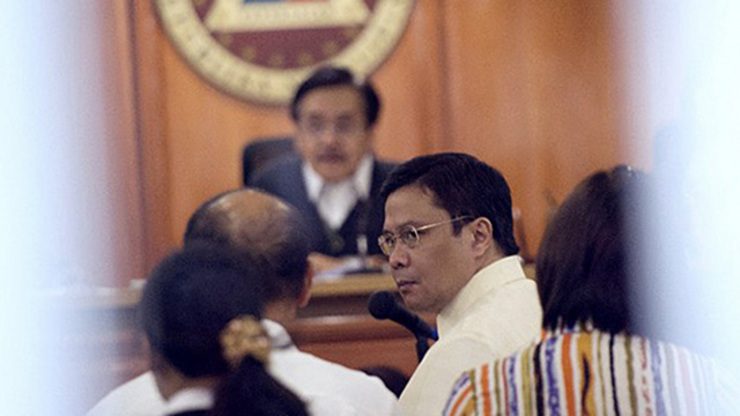SUMMARY
This is AI generated summarization, which may have errors. For context, always refer to the full article.

MANILA, Philippines – The prosecution team in Senator Jose “Jinggoy” Estrada’s plunder and graft cases opposed on Monday, September 1, his move to be allowed to conduct Senate deliberations on pending bills while in detention.
“All told, the intended committee hearings to be conducted by accused Estrada will be a precedent-setting exercise which is not sanctioned by the law and the rules,” the prosecution’s comment filed before the anti-graft court Sandiganbayan read.
Citing the case of Senator Antonio Trillanes IV, the prosecution argued that the Supreme Court had previously denied a detainee’s request to be allowed to attend Senate committee hearings.
“The Supreme Court rationalized the limitation on Senator Trillanes’ movements and performance of his elected post by citing a host of cases that has consistently upheld the limitation and curtailment on the freedom and liberties of a detainees,” the comment-opposition read.
The prosecution likewise cited the court’s issuance of a 90-day suspension order against Estrada.
On August 18, Estrada asked the anti-graft court to be allowed to conduct committee hearings inside Camp Crame or any other place the court deems appropriate “to expedite the passage of much-needed laws,” including those on the rights for seafarers and call center agents.
The detained senator cited 12 priority bills pending with the Senate committee on labor, employment, and human resources development, of which he is chairman.
Estrada is currently detained at the Philippine National Police (PNP) Custodial Center in Camp Crame over plunder and graft charges.
He is accused of financially gaining from and knowingly allowing the diversion of millions from his Priority Development Assistance Fund (PDAF) to ghost projects of fake non-governmental organizations controlled by alleged scam mastermind Janet Lim Napoles.
‘No precedent’
In arguing for his request, Estrada cited as precedent the committee hearings he said was conducted at the Marine Naval Station in Fort Bonifacio and at Camp Crame in the years 2007 and 2010, respectively.
This was when Senator Trillanes was detained over coup d’etat charges.
But the prosecution said “the reference is misleading,” as Trillanes was simply visited in detention by his fellow senators.
Quoting a newspaper report, the prosecution said Trillanes was visited by senators Gringo Honasan, Ferdinand Marcos Jr, and Vicente Sotto III on August 19, 2010, to get “inputs on how to improve coordination with other committee members.”
“Thus, whoever allowed Senator Trillanes to conduct the alleged committee hearings had no authority or legal basis to do so,” they argued.
“To deny the motion of accused Estrada will effectively give meaning to the precept that ours is a government of laws not of men…. Indeed, the current persuasion is towards holding high-ranking public officials accountable to a degree slightly higher than the regular public servant,” the prosecution argued.
Jalosjos case
The team also cited the case of former Zamboanga del Norte Representative Romeo Jalosjos, who was later on convicted in 1997 by a Makati court for raping an 11-year-old girl.
“The issue of the performance of law-making functions by a detained legislator was squarely met in the case of People vs Jalosjos. The Supreme Court frowned upon the idea of allowing then Congressman Jalosjos to attend the proceedings in the House of Representatives,” the prosecution claimed.
In the subject ruling, the SC said Jalosjos’ attendance to congressional proceedings “will virtually make him a free man.”
“The performance of legitimate and even essential duties by public officers has never been an excuse to free a person validly in prison… Never has the call of a particular duty lifted a prisoner into a different classification from those others who are validly restrained by law,” the ruling read.
The SC further ruled that “Congress continues to function well in the physical absence of one or a few of its members.”
Estrada’s plea, however, seemed to be one step ahead.
His appeal before the court was for him be allowed to conduct the hearings inside his place of detention and not necessarily be allowed to leave the police camp premises. – Rappler.com
Add a comment
How does this make you feel?
There are no comments yet. Add your comment to start the conversation.